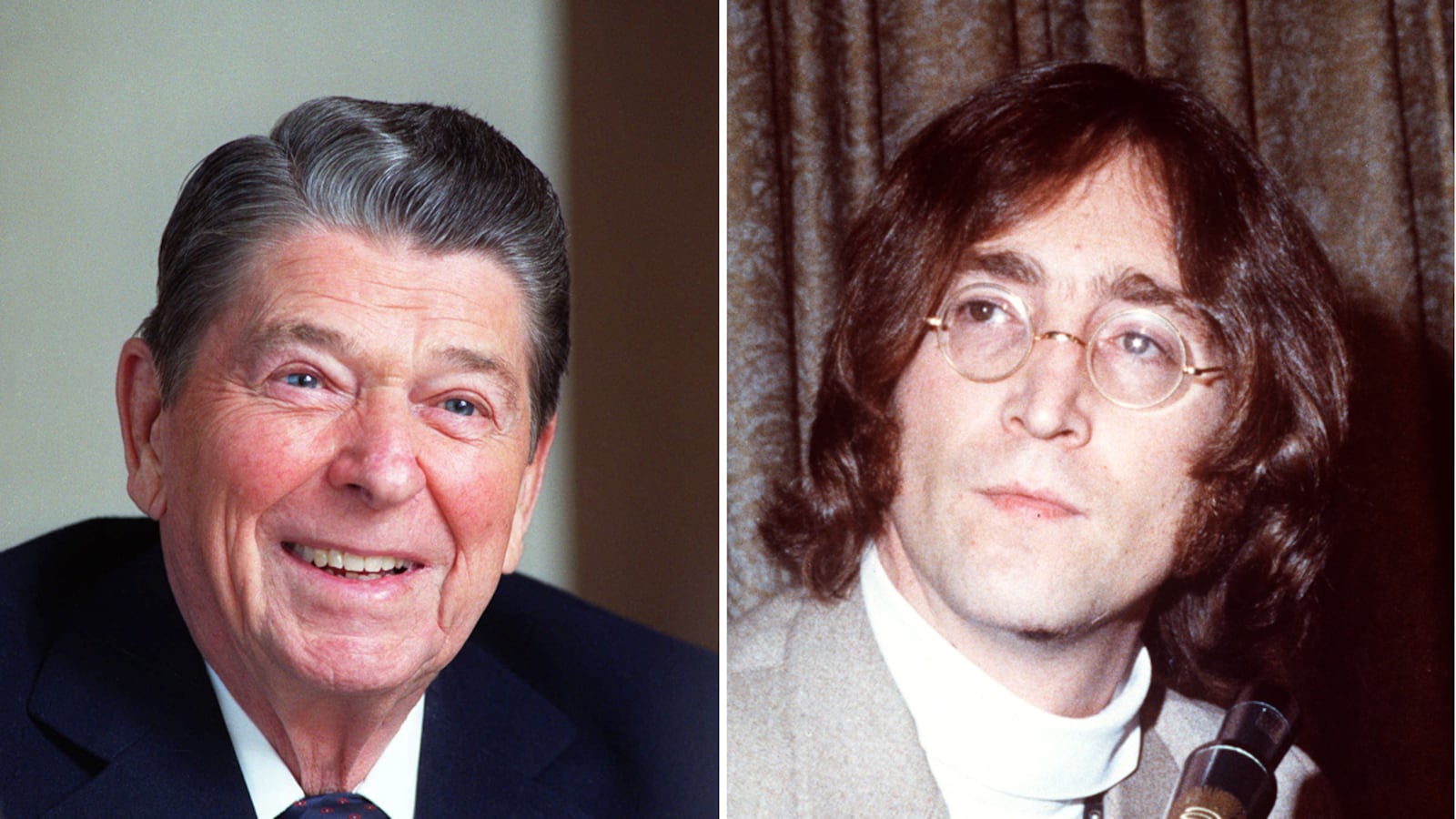Was John Lennon a conservative?
Scores of balding, graying, drooping Baby Boomer peaceniks must have choked on their sweet and sour seitan Wednesday when reports surfaced about the “shocking” claim made by Lennon’s last personal assistant in a new documentary. According to Fred Seaman, who worked for Lennon from February 1979 until he was shot and killed by a deranged fan on December 8, 1980, the counterculture icon who once asked us to imagine a world without organized religion, personal property, or national sovereignty was, in fact, a secret Ronald Reagan fan.
“John, basically, made it very clear that if he were an American he would vote for Reagan because he was really sour on Jimmy Carter,” says Seaman. “He’d met Reagan back, I think, in the ‘70s at some sporting event [and] did express support for [him], which shocked me.”
According to the Toronto Sun, Seaman goes on to reveal that “John embark[ed] in [sic] some really brutal arguments” with the assistant’s communist uncle, making it “pretty obvious [that] he had moved away from his earlier radicalism.” Lennon “was a very different person back in 1979 and ‘80 than he’d been when he wrote ‘Imagine,’” Seaman says. “By 1979 he looked back on that guy and was embarrassed by that guy’s naivete.”

The response to Seaman’s statement has been rather predictable, with chest-thumping from conservatives eager to claim Lennon as one their own and anger from liberals unwilling to let a creep who stole hundreds of Lennon’s private documents and recordings tarnish their image of the Liverpudlian legend.
But if you care about who Lennon really was—and not just who our culture imagines him to be—there are only two things to say here: “No duh,” and, “So what?”
Let’s start with no duh. Despite all the headlines about Lennon’s “closet conservatism,” it’s important to zero in on what his former assistant is actually claiming. He didn’t say Lennon had joined the Republican Party. He didn’t even say that he’d become a conservative. Instead, Seaman noted that Lennon “would vote for Reagan” over Carter and that he would occasionally argue with communists. Neither revelation is especially revelatory.
By 1980, Lennon had long since soured on the radical leftist politics of his youth, telling Playboy’s David Sheff in his last major interview that he “dabbled in so-called politics in the late ‘60s and ‘70s more out of guilt than anything. Guilt for being rich, and guilt thinking that perhaps love and peace isn’t enough and you have to go and get shot or something, or get punched in the face, to prove I’m one of the people. I was doing it against my instincts.”
Disillusioned with harsh, overreaching Yippies like Jerry Rubin and Abbie Hoffman, Lennon now emphasized individual responsibility rather than collective political action. “Produce your own dream,” he told Sheff. “If you want to save Peru, go save Peru. It’s quite possible to do anything, but not if you put it on the leaders and the parking meters. Don’t expect Carter or Reagan or John Lennon or Yoko Ono or Bob Dylan or Jesus Christ to come and do it for you. You have to do it yourself.”
Lennon’s self-reliant streak made him skeptical of pop-culture charity efforts—and even foreign aid. When Sheff pointed out that a Beatles reunion could raise “$200 million [for] a poverty-stricken country in South America," Lennon balked. “I am not going to get locked in that business of saving the world on stage,” he said. “The show is always a mess and the artist always comes off badly… [Plus] America has poured billions into places like that. It doesn’t mean a damn thing. After they’ve eaten that meal, then what? It lasts for only a day. After the $200 million is gone, then what? It goes round and round in circles.”
Given his libertarian leanings—and given his insistence that he was “not here for you” but rather “for me and her [Yoko] and the baby”—it’s not particularly difficult to picture Lennon clashing with a cranky old communist or two. Nor is it much of a challenge to imagine him preferring Reagan to the earnest, evangelical, flailing Carter (or at least saying he preferred Reagan). By the late 1970s, millions of not-so-conservative former hippies like Lennon were growing up, getting jobs, and settling down. To them, Reagan’s message—family values, individual responsibility—had a certain au courant appeal, which is why the former Hollywood actor was able to defeat a sitting president by more than 8 million votes in the 1980 election. Lennon was always skeptical of authority. Who’s to say the whole “get the government off our backs” mantra didn’t resonate with him?
So is it possible that Lennon liked Reagan more than Carter? Sure (although the anti-war side of him would have tired of the Gipper’s martial rhetoric). The problem is that it’s absolutely impossible to infer from such speculation that the former Beatle possessed a cohesive political worldview—to claim, in other words, that he was “a conservative” (or for that matter, “a liberal”).
Why? Because Lennon’s late-period views weren’t political at all. They were radically, explicitly apolitical. Hence the “so what?” part of the equation. “I have never voted for anybody, anytime, ever,” he told Sheff less than two months before Election Day 1980—Reagan included. “Even at my most so-called political. I have never registered and I never will. It’s going to make a lot of people upset, but that’s too bad.”
Lennon’s point was that politics is secondary, and that our personal battles are paramount. “I can’t wake you up,” he said. “You can wake you up. I can’t cure you. You can cure you.” (Or, as Yoko Ono put it in the same interview, “in order to survive and to change the world, you have to take care of yourself first. You have to survive yourself.”) Lennon had already tried to fashion his fame into a functional thing, advocating for peace in bed with Yoko and writing songs about John Sinclair. Now he was content to be a father, and a husband, and an artist, and to leave the politicking to politicians. He would have been surprised, and none too pleased, to see us supplying him with ideologies he chose not to have.






